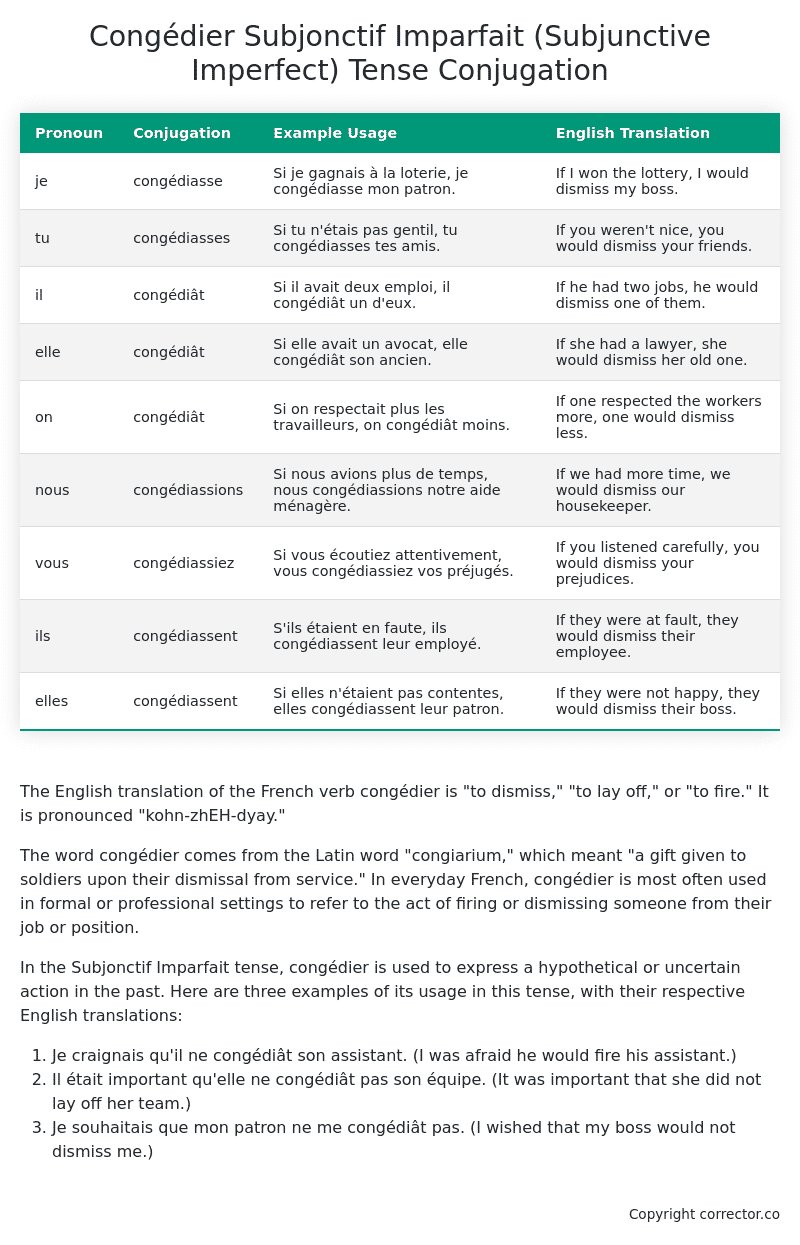Subjonctif Imparfait (Subjunctive Imperfect) Tense Conjugation of the French Verb congédier
Introduction to the verb congédier
The English translation of the French verb congédier is “to dismiss,” “to lay off,” or “to fire.” It is pronounced “kohn-zhEH-dyay.”
The word congédier comes from the Latin word “congiarium,” which meant “a gift given to soldiers upon their dismissal from service.” In everyday French, congédier is most often used in formal or professional settings to refer to the act of firing or dismissing someone from their job or position.
In the Subjonctif Imparfait tense, congédier is used to express a hypothetical or uncertain action in the past. Here are three examples of its usage in this tense, with their respective English translations:
- Je craignais qu’il ne congédiât son assistant. (I was afraid he would fire his assistant.)
- Il était important qu’elle ne congédiât pas son équipe. (It was important that she did not lay off her team.)
- Je souhaitais que mon patron ne me congédiât pas. (I wished that my boss would not dismiss me.)
Table of the Subjonctif Imparfait (Subjunctive Imperfect) Tense Conjugation of congédier
| Pronoun | Conjugation | Example Usage | English Translation |
|---|---|---|---|
| je | congédiasse | Si je gagnais à la loterie, je congédiasse mon patron. | If I won the lottery, I would dismiss my boss. |
| tu | congédiasses | Si tu n’étais pas gentil, tu congédiasses tes amis. | If you weren’t nice, you would dismiss your friends. |
| il | congédiât | Si il avait deux emploi, il congédiât un d’eux. | If he had two jobs, he would dismiss one of them. |
| elle | congédiât | Si elle avait un avocat, elle congédiât son ancien. | If she had a lawyer, she would dismiss her old one. |
| on | congédiât | Si on respectait plus les travailleurs, on congédiât moins. | If one respected the workers more, one would dismiss less. |
| nous | congédiassions | Si nous avions plus de temps, nous congédiassions notre aide ménagère. | If we had more time, we would dismiss our housekeeper. |
| vous | congédiassiez | Si vous écoutiez attentivement, vous congédiassiez vos préjugés. | If you listened carefully, you would dismiss your prejudices. |
| ils | congédiassent | S’ils étaient en faute, ils congédiassent leur employé. | If they were at fault, they would dismiss their employee. |
| elles | congédiassent | Si elles n’étaient pas contentes, elles congédiassent leur patron. | If they were not happy, they would dismiss their boss. |
Other Conjugations for Congédier.
Le Present (Present Tense) Conjugation of the French Verb congédier
Imparfait (Imperfect) Tense Conjugation of the French Verb congédier
Passé Simple (Simple Past) Tense Conjugation of the French Verb congédier
Passé Composé (Present Perfect) Tense Conjugation of the French Verb congédier
Futur Simple (Simple Future) Tense Conjugation of the French Verb congédier
Futur Proche (Near Future) Tense Conjugation of the French Verb congédier
Plus-que-parfait (Pluperfect) Tense Conjugation of the French Verb congédier
Passé Antérieur (Past Anterior) Tense Conjugation of the French Verb congédier
Futur Antérieur (Future Anterior) Tense Conjugation of the French Verb congédier
Subjonctif Présent (Subjunctive Present) Tense Conjugation of the French Verb congédier
Subjonctif Passé (Subjunctive Past) Tense Conjugation of the French Verb congédier
Subjonctif Imparfait (Subjunctive Imperfect) Tense Conjugation of the French Verb congédier (this article)
Subjonctif Plus-que-parfait (Subjunctive Pluperfect) Tense Conjugation of the French Verb congédier
Conditionnel Présent (Conditional Present) Tense Conjugation of the French Verb congédier
Conditionnel Passé (Conditional Past) Tense Conjugation of the French Verb congédier
L’impératif Présent (Imperative Present) Tense Conjugation of the French Verb congédier
L’infinitif Présent (Infinitive Present) Tense Conjugation of the French Verb congédier
Struggling with French verbs or the language in general? Why not use our free French Grammar Checker – no registration required!
Get a FREE Download Study Sheet of this Conjugation 🔥
Simply right click the image below, click “save image” and get your free reference for the congédier Subjonctif Imparfait tense conjugation!

Congédier – About the French Subjonctif Imparfait (Subjunctive Imperfect) Tense
Formation
Common Everyday Usage Patterns
Interactions with Other Tenses
Subjonctif Présent
Indicatif Passé Composé
Conditional
Conditional Perfect
Summary
I hope you enjoyed this article on the verb congédier. Still in a learning mood? Check out another TOTALLY random French verb conjugation!


